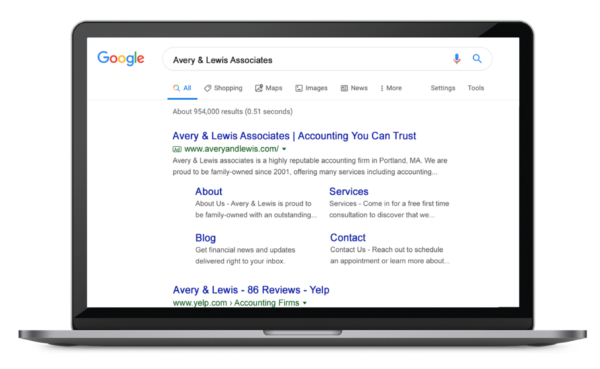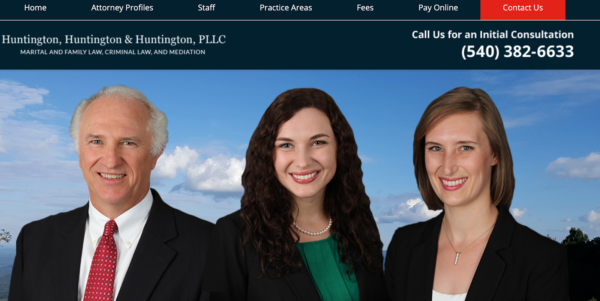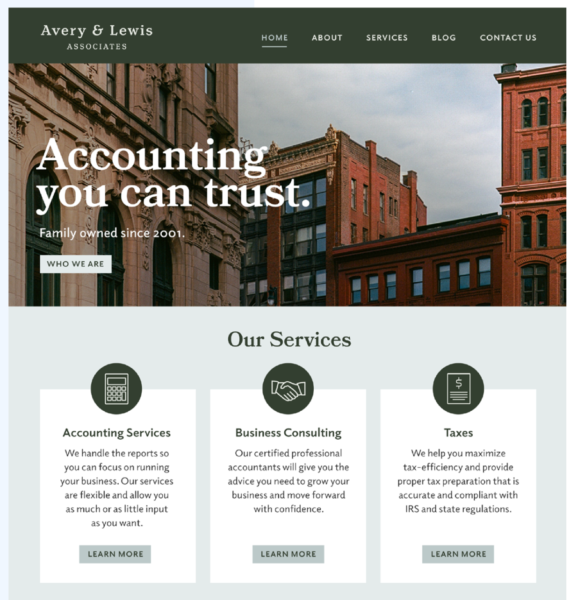
Whether you’re just starting or you’re ready to grow your client base, you’ll need to decide how to make the most of your expansion efforts. Marketing of legal services you offer effectively is sure to bring you success.
Below, you’ll find a guide to help you through the process of marketing your law firm. This article will touch on the seven key strategies you’ll want to address as you maximize your marketing efforts.
Get new clients and drive referrals with marketing tools and advice for legal professionals.
1. SEO for legal marketing
If you expect to drive a significant portion of your business through your website and other online channels, your search engine rank can make or break your legal business. It would be well worth your time to gain a basic understanding of how search engine optimization (SEO) helps determine your page rank.
What is SEO?
Optimizing your legal service’s website to increase your search engine rank means improving the quality and increasing the quantity of traffic. The latter is done through non-paid or organic ways of moving your listings further up the search engine results pages (SERPs). Essentially, using SEO gives your website — or any web page — more credibility in the search engine’s eyes.
Google’s goal is to serve up meaningful suggestions for searchers, so the latter will continue using its service. Over the past several years, Google and other search engine providers have created algorithms that can differentiate authentically useful websites from those stuffed with keywords and backlinks.
When Google’s algorithms sort pages, they move sites that include certain qualities closer to the top of the page. At a high level, search engines reward websites that have:
- Well-researched keywords and keyword phrases
- High-quality content, including the text on web pages and blog posts
- Sites that are updated regularly
- Mobile-responsiveness, as most web traffic originates from mobile devices
- Loading speed
- Secure pages
- Clean code
- Relevant, authoritative information
What qualifies as high-quality content?
High-quality content provides value to the reader. Search engines are quite sophisticated when it comes to spotting fluff and filler. A good rule of thumb is to create content that teaches readers something valuable. Put yourself in your readers’ place. If the content is not something you’d enjoy reading, you may need to work on its quality.
As a legal professional, high-quality content could include a blog series outlining laws related to one of your practice areas. Or it could be as simple as an engaging About page.
Keywords are essential, but they are only part of the equation. Spend time researching which keywords are most likely to resonate with website visitors and naturally weave them into your content. Don’t forget to include keywords in some of your titles, headings, and captions.
2. Google Ads for legal services
Advertising is an essential component of your overall legal marketing plan. You have many options for placing paid ads online, but pay-per-click (PPC) models are the most common. These can give you a good return on your investment.
Google Ads is the most widely used platform for managing PPC ad campaigns. Two other notable options are Microsoft Advertising and Amazon. While Amazon may seem like an unlikely choice for advertising your legal services, many attorneys and other legal professionals create and sell ebooks and other material through the platform.
What is Google Ads?
Google Ads is an online advertising platform. You can purchase Google Ads that will appear in search engine results, non-search websites, mobile apps, and videos.
Unlike traditional advertising, however, you cannot merely pay for an ad to appear using Google Ads. You’ll be competing with other advertisers using the same and similar keywords to reach audiences.
How does a Google Ads auction work?
Google takes three main factors into account when determining which ads appear and in what order:
- Your bid or the maximum amount you’ll pay for a single click on your ad
- The quality and relevancy of your ad
- The expected impact from your ad extensions and other ad formats
Google Ads inspects the quality of your ads and decides how useful they and the website they link to are to visitors. You can check your Google Quality Score in your Google Ads account.
When Google calculates your ad’s expected impact, it considers features like including a phone number or links to specific pages within your website. Making adjustments can help you win auctions even when you aren’t the highest bidder because Google will prioritize ads with highly relevant keywords and extensions.

3. A social media presence
Marketing legal services you offer should include a focus on social media. More than 40% of the world’s population uses a social media account. More than 50% of those users depend on social media to research products and brands. Therefore, social networks offer a unique opportunity for getting your message in front of many people without much effort.
Beyond the sheer volume of users, social media can help you accomplish several important marketing goals. Social networks:
- Allow you to engage directly with your target audience
- Boost your SEO efforts
- Create brand awareness
- Give you a platform for establishing your expertise
How do you develop your social media strategy as a legal services provider?
Take the time to develop a social media strategy before diving into social media promotion. You’ll have more success if you spend some time evaluating which networks are the best fit for your brand — and most importantly, which ones will connect you to your ideal clients.
Here are a few guidelines to follow when considering your social media approach:
- Create compelling content. Think of your social media posts as part of a conversation versus another advertising option.
- Incorporate eye-catching visuals. You’re competing with many other accounts to grab the attention of your audience.
- Decide how you’ll monitor and respond to posts and messages. Your social media work will be far less effective if you don’t actively engage with your audience.
- Post consistently. A dormant social media account does not inspire confidence in would-be clients.
What should you post?
Your social media posts will vary by platform. LinkedIn content is very different from Twitter content. However, all social networks offer an opportunity to share unique legal content.
You can create and post useful content like:
- Infographics focused on different legal topics
- Informative videos
- Legal industry news
- Special offers
The sky’s the limit. Still, it’s important to maintain the same brand style and tone across all your social media accounts.
Ask yourself if your social content seems on-brand before you post. Not sure of your brand identity? Don’t miss the law firm branding section further along in this article.
4. Effective legal services email marketing campaigns
You might be surprised to learn that despite being one of the first ways marketers connected with internet audiences a few decades ago, email is still an incredibly effective way to convert leads.
What is email marketing?
Email marketing is exactly what it sounds like: using email to promote products or services. Beyond sales emails, though, you can use email marketing to strengthen client relationships. It’s an affordable, simple way to deliver your legal email marketing messages.
Why should you use email marketing to promote your legal business?
One of the most compelling reasons to get into email marketing — if you haven’t yet — is the incredible reach email provides. An estimated 4.3 billion people will have an email account by 2024. That’s half the world’s population.
Email users are highly engaged. In addition to sending almost 300 million emails every day, email users are receptive to marketing messages. The industry average open rate is around 16–17%.
Personalized emails are even more attractive to email users. Emails that include customized subject lines generate 50% higher open rates over the average email open rate.
How can you come up with legal email marketing campaign ideas?
Email marketing of legal services should go beyond the standard advertising vehicle. You can use this medium to promote your brand in a way you can’t anywhere else.
You’ll most likely need to apply different approaches to connect with the various groups of clients you want to target. New clients should see unique messages versus messages intended for prospective or long term clients. Sometimes, your message may apply more broadly. Still, it’s a good idea to segment your email marketing list when it comes to marketing.
Here are a few ideas to consider for email-based legal marketing campaigns:
- Announcements and law firm news — promotions, new clients, and personal milestones
- A new client toolkit with links to information about your practice and contact details
- Loyalty emails thanking long-term clients on the anniversary of their first transaction
- A newsletter focused on interesting legal news your clientele would appreciate
Finding inspiration in Constant Contact’s legal email marketing ideas and templates is a great way to start your next campaign.
5. Law firm branding
How would you describe your law firm or business to someone who has never heard of it? If you aren’t sure, it may be time to put some work into branding.
What is a law firm brand?
Your legal brand is one way to share the personality of your law firm. Everything you use in your marketing materials, from the logo and voice to the colors you choose for your website and letterhead, ties into your brand.
If you don’t work deliberately to brand your legal practice, your reputation will rest on how people choose to interpret whatever message you’re putting out there. Haven’t been thinking much about branding? Your messages might be coming across as jumbled, less than professional, or inconsistent — all traits that are sure to turn off potential clients.
How do you build a law firm brand?
One insightful and helpful branding approach is to spend some time developing your brand’s persona. Think about what problems you solve and the kind of clients you appeal to or would like to attract. Below is an example.

This firm’s branding persona could be described as:
- Focused on estate and family law
- Friendly and approachable
- Appealing mostly to older clients who are experiencing transitional life events
- Working to protect clients today and tomorrow
As you can see, this law firm’s brand is relatable. The site features a friendly photo of the attorneys on the home page and includes straightforward, welcoming language. Other firms might take a more formal approach that would appeal to clients who need legal services in fields like technology or medicine.
It’s essential to take the time to develop a deep understanding of your company’s brand. The success of your efforts in the marketing of legal services you offer relies on a foundation of clear, engaging branding.

6. A focus on credibility, trust, and authority
As a member of the legal community, you are undoubtedly aware of how vital credibility, trust, and authority are to prospective clients. This is true for several key reasons.
Why does credibility matter?
Clients depend on you to help them navigate the legal system with expertise.
Make it easy for prospective clients to get a feel for why you’re a credible legal professional. To do this, you can:
- Share your successes through email and social media
- List your credentials and experience on your website
- Ask satisfied clients to create testimonials that you can share in various ways
Why does trust matter?
Clients often share personal or painful information with you and need to feel that they can trust you to protect their privacy.
Legal services can become expensive for people, especially with practices related to family law and other non-corporate areas. When clients invest their money and time with you, they need to feel that they are partnering with a legal professional who knows the law inside and out and who has their back.
There are several ways you can assure clients that you can be trusted. You may:
- Convey a trustworthy attitude and be authentic when you create marketing messages and advertisements
- Interact with clients on social media in a straightforward, welcoming way
- Join local groups like chambers of commerce and the boards of prominent community organizations
Why does authority matter?
Authority is similar to credibility but it goes beyond your credentials. It’s less about what you can do and more about why you’re the best option for that work. Remember that clients have many choices for legal representation. They are more likely to select a firm that seems to be an authority in the marketplace.
Establishing authority means becoming a prominent expert in your field. Here are a few ideas to develop an authoritative presence:
- Publish articles in legal journals and local publications
- Position your firm as an exclusive, unique practice
- Highlight testimonials about your work with other leaders in the field
Your overarching goal for establishing authority should be to deliver a message that centers on your role as an expert in your chosen practice area or areas.
7. Client reviews and testimonials
Client reviews and testimonials can go a long way toward reaching your legal marketing goals. Potential clients feel more confident about partnering with an attorney or legal professional who has been vetted by other people.
The easiest and most effective way to get glowing feedback that you can use in your marketing materials is simply asking. Reach out to clients who seem happy and satisfied with your services and ask them to write a few words about why they turn to you for legal help.
You can also solicit reviews and testimonials in places like your social media posts and email marketing. Most people understand how valuable these reviews can be for professionals and won’t find your request off-putting. It’s just a part of doing business.
Another good source for reviews and testimonials is online review sites like Avvo. Check to see if anyone has left a review and share the positive feedback with your clients.
Key takeaways
We’ve focused on seven strategies you can use in the marketing of legal services that you offer. These basics are only some of many possible approaches to developing your legal marketing strategy. In the end, you’re likely to use more than one of these suggested approaches. You might even try all of them. Each law firm has different needs when it comes to marketing.
If you’re feeling a bit overwhelmed, you can start by checking out The Download. In this resource, Constant Contact has put together a step-by-step approach for establishing your legal marketing strategy. You can also pick up some helpful ideas on our legal services marketing blog.




